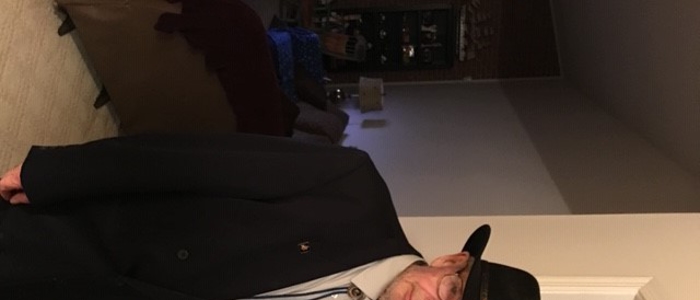Peace at the End
Donald Greenway was proud of his career as an officer with Washington D.C.’s Metropolitan Police Force. A perfectionist who believed in “doing things right,” Donald was a member of the Force’s executive security detail, the contingent that later became the Secret Service. Along with protecting five U.S. presidents, Donald’s responsibilities included patrolling Embassy Row and ensuring the safety of countless dignitaries, ambassadors, and visiting heads of state.
“His work was extremely high-pressure,” says his daughter, Laurie Roberts, “He never talked much about the things he saw and experienced, but I know they taught him that the world was often a scary, threatening place. I think that’s why he was always such a protective father.”
The pressures of his job eventually took a permanent toll on Donald. He retired from the force in 1979, spending the next 40 years of his life coping with Post Traumatic Stress Disorder combined with a serious mood disorder. Although he was often difficult to deal with when he was having a flare-up, Laurie’s devotion to him never wavered.
“Dad was protective of me when I was younger, and then the tables turned,” she explains. “Suddenly, it was my turn to protect and take care of him.”
Last November, after Donald fell and broke his hip at his home in Virginia, Laurie moved him to Assisted Living in Frederick. After declining steadily, he was finally diagnosed with an infected gall bladder in mid-January. Faced with a dangerous surgery or intensive antibiotic treatment, Donald summoned the no-nonsense, matter-of-fact attitude that had served him so well as a police officer. After hearing his options, Donald asked Laurie to help him find him a way to live out the rest of his days in peace and comfort.
That’s how Donald and Laurie came to be riding in an ambulance together from Frederick Memorial Hospital to the Kline Hospice House on a cold, clear Friday morning in January. Laurie recalls that her Dad instantly loved the House’s quiet, pastoral setting. Every day, Donald’s nurse would open the French doors in his private room so that he could see the acres of fields surrounding the house, much like those on the farm in Pennsylvania where he had grown up. Donald quickly felt comfortable with the Kline House staff, especially the hospice chaplain, Father Pothin, who came to visit often.
“My father could be difficult,” says Laurie. “Caregivers were frequently impatient with him, but the Kline House staff was completely different. They had a wonderful way of soothing and calming him, and Dad trusted them to care for his daily needs. That allowed me to just be his daughter again. I can’t express what a gift that was—to both of us.”
Two weeks after Donald’s arrival at the Kline House, Laurie received the news that her sister, Pam, a breast cancer survivor, had been re-admitted to the hospital in Virginia. Although he was unaware of the phone call, Donald’s vital signs began to decline rapidly. He died peacefully moments later, but not before his heart rate and respirations inexplicably stabilized again for a short time. Shortly after, Laurie got word from family in Virginia that her sister had also died, very near to the time Donald’s vital signs had stabilized. As it turned out, father and daughter had died within an hour of one another.
“In the face of this enormous loss, my family and I found some comfort in picturing Dad and Pam waiting for each other, just this side of Heaven,” says Laurie. “That was just who he was…a loving parent and a protective father. He would’ve wanted to walk Home side-by-side with one of his girls.”
“At Kline House, the staff gave my father the three things that he had lived most of his adult life without: respect, compassion, and understanding,” says Laurie. “Everyone deserves to know that kind of peace at the end. We are forever grateful to Hospice of Frederick County.”


